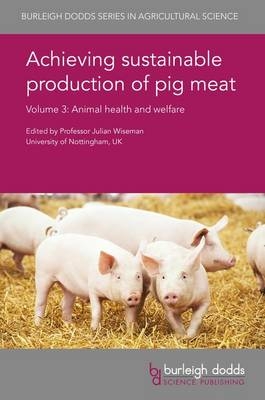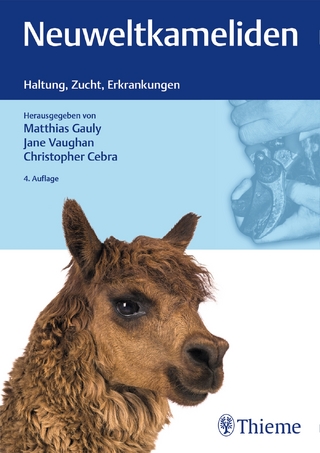
Achieving Sustainable Production of Pig Meat Volume 3
Burleigh Dodds Science Publishing Limited (Verlag)
978-1-78676-096-8 (ISBN)
‘…individual chapters provide very thorough, up-to-date reviews of health and welfare of pigs during different stages of production…The health section does a good job of summarizing the current major disease challenges facing pig production…If you want up-to-date reviews on some of the most pressing welfare issues in different stages of production, there are some good chapters included.’
Animal Welfare
Pig meat is the most widely-consumed meat in the world. Previous growth in production has relied, in part, on more intensive systems. In meeting rising demand, these systems face challenges such as the ongoing threat of zoonotic diseases, the need to improve feed efficiency in the face of rising costs, the need to reduce the environmental impact of pig production and increasing concerns about animal welfare.
This volume looks at animal health and welfare. Part 1 reviews the main diseases affecting pigs as well as ways of managing diseases and boosting pig immune function. Part 2 reviews what we know about pig behaviour and appropriate welfare standards. It also assesses the welfare of different groups of pigs, from gilts and sows to weaned piglets and finishing pigs, as well as transport, lairage and slaughter.
With its distinguished editor and international team of expert authors, this will be a standard reference for researchers in swine science, producers, government and other organisations involved in supporting pig production. It is accompanied by two companion volumes which focus on safety, quality and sustainability as well as animal breeding and nutrition.
Dr Julian Wiseman is Professor of Animal Production at the University of Nottingham, UK. He has published widely in the area of non-ruminant nutrition, presented papers at some of the leading international conferences in this area and has written or edited a number of books on animal nutrition. He is co-organiser of the annual Nottingham Feed Conference. Dr Mick Bailey is Professor of Comparative Immunology at the University of Bristol’s world-famous Veterinary School. Professor Bailey has an international reputation for his research on the development of the mucosal immune system in pigs. Dr Dominiek Maes is Professor of Porcine Health Management in the Faculty of Veterinary Medicine at Ghent University, Belgium. Dr Jeroen Dewulf is a full Professor in Veterinary Epidemiology at the Faculty of Veterinary Medicine of Ghent University. His main research interests are quantitative epidemiology and control of zoonoses with a specific emphasis on antimicrobial use and resistance in animals as well as the prevention of epidemic and endemic diseases with a focus on the application of biosecurity measures. He is the head of the Veterinary Epidemiology Unit and is supervising over 10 Ph.D. students who are doing research in the field of veterinary epidemiology. He is (co-)author of over 300 A1 publications in the field of veterinary epidemiology with an H-index of 45. He is the principal author of the annual Belgian report on Antimicrobial Consumption in Animals (BelVetSac) and chair of the JPI-AMR network on the quantification of antimicrobial consumption in animals at herd level. Since 2009 he is a member of the scientific committee of the Belgian federal food agency and is the founder and chair of the board of the center of expertise on antimicrobial use and resistance in animals (AMCRA) in Belgium. Dr Sandra Edwards is Emerita Professor in the School of Natural and Environmental Sciences at Newcastle University, UK. Professor Edwards is widely regarded as one of the world’s leading experts on pig welfare with over 200 publications in the field. She has won numerous awards, including from organisations such as UFAW, EAAP, RSPCA and BSAS. She is a former President of the British Society of Animal Science, a Fellow of the Royal Agricultural Society of England, as well as a former member of the UK Farm Animal Welfare Council and the Animal Health and Welfare Panel of the European Food Safety Agency.
Part 1 Animal health
1.Diseases affecting pigs: an overview of common bacterial, viral, and parasitic pathogens of pigs: Alejandro Ramirez, Iowa State University, USA;
2.Changing patterns of disease affecting pigs: Porcine Reproductive and Respiratory Syndrome (PRRS) and Porcine Epidemic Diarrhoea (PED): Carla Correia-Gomes, Scotland’s Rural College, UK;
3.The influence of gut microbiome on developing immune and metabolic systems in the young pig: Mick Bailey, Emily Porter and Ore Francis, University of Bristol, UK;
4.Disease identification and management on the pig farm: Dominiek Maes, Jeroen Dewulf, Filip Boyen and Freddy Haesebrouck, Ghent University, Belgium;
Part 2 Welfare issues
5.Understanding pig behaviour: Simon P. Turner and Richard B. D’Eath, Scotland’s Rural College, UK;
6.Defining and ensuring animal welfare in pig production: an overview: Paul H. Hemsworth, University of Melbourne, Australia;
7.Pasture systems for pigs: Silvana Pietrosemoli and James T. Green, North Carolina State University, USA;
8.Welfare of gilts and pregnant sows: Sandra Edwards, Newcastle University, UK;
9.Welfare of weaned piglets: Arlene Garcia and John J. McGlone, Texas Tech University, USA;
10.Welfare of pigs during finishing: Jonathan Amory, Writtle College, UK; and Nina Wainwright, British Pig Executive (BPEX), UK;
11.Transport and lairage of pigs: Jennifer M. Young, North Dakota State University, USA;
12.Humane slaughter techniques for pigs: Susanne Støier, Leif Lykke and Lars O. Blaabjerg, Danish Meat Research Institute – Danish Technological Institute, Denmark;
| Erscheinungsdatum | 30.03.2018 |
|---|---|
| Reihe/Serie | Burleigh Dodds Series in Agricultural Science ; 25 |
| Co-Autor | Prof Alejandro Ramirez, Dr Carla Correia-Gomes, Prof. Mick Bailey, Emily Porter |
| Zusatzinfo | Colour tables, photos and figures |
| Verlagsort | Cambridge |
| Sprache | englisch |
| Maße | 152 x 229 mm |
| Gewicht | 635 g |
| Themenwelt | Veterinärmedizin ► Großtier |
| Weitere Fachgebiete ► Land- / Forstwirtschaft / Fischerei | |
| ISBN-10 | 1-78676-096-7 / 1786760967 |
| ISBN-13 | 978-1-78676-096-8 / 9781786760968 |
| Zustand | Neuware |
| Haben Sie eine Frage zum Produkt? |
aus dem Bereich


